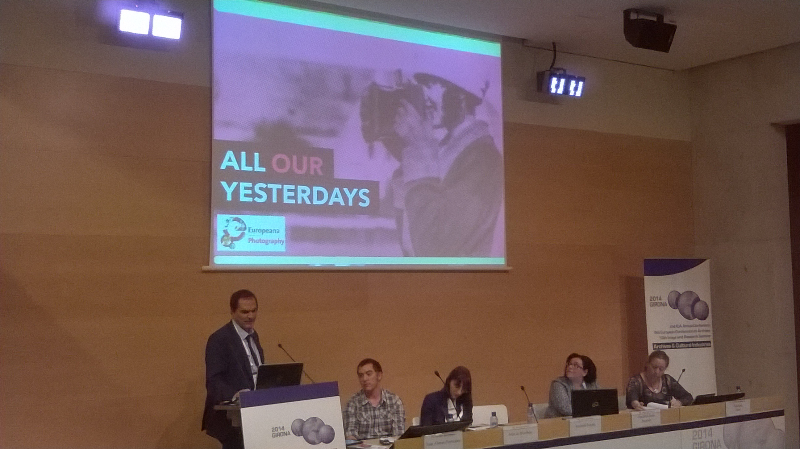img. from archives: Fred Truyen presenting Europeana Photography project at ICA congress in Girona (2014).
Recently, KU Leuven Library published a nice interview by Merisa Martinez to prof. Fred Truyen, Programme Director of the Advanced Master’s in Digital Humanities at KU Leuven, to appear on the Digital Humanities Commons blog, kicking off in the best way the second semester of the academic year for students and professors involved in Digital Humanities training and teaching at KU Leuven.
Starting from the early days of his career in the nineties, Fred tells a lot of the changes that a state-of-the-art university like KU Leuven experienced with the development of the web and with the need of implementing ICT-based project for innovation in education.
“The first that I did was CD-ROMs for history education with Raf De Keyser, who was a history professor. He had this quite innovative idea about using CD-ROMS in education to teach history. That was a fantastic experience. We went to several schools, we worked with a local publisher, and we made CD-ROMs – on the middle ages mostly – and that worked very well.”
From there, a path for a new university ICT infrastructure started, in order to support educational projects, despite not all teachers were really interested or digitally skilled enough to get familiar with an online e-learning environment. The university therefore invested in fresh staff to train the professors and to engage with students, for enabling innovative teaching practices backended with solid ICT.
“That is still my vision, that ICT is comprehensive: you need to start from your core processes and derive the functionality from those. And make sure that your ICT system reflects the concepts and the processes that you do. That is the same issue that I have now with digital heritage, in that I think that it’s not about putting nice collections online, it is about transforming how a heritage institution works from the start to the finish. It’s capturing all processes and translating them into digital processes. And of course some of the processes are not digital at all – restoration, preservation, all these kind of things – but of course also these services can be connected in information systems. The libraries of course followed suit, and I was involved in thinking about what the library services should mean for research.“
One milestone in Fred’s carrier and research is the very successuful Europeana Photography project, where digital technology, research and cultural heritage came together with discovering heritage photography.
“That was really one of the nicest projects. Normally with these European projects, the partner meetings are quite boring, because you have the work packages, you have the budget allocation, you have the time allocation, and we tended to review all these slides about this stuff. Now, in the second or third meeting of Europeana Photography project, a colleague from United Archives, showed me a new photo collection that he had discovered. During the break, on his iPhone, he showed me – and they were magnificent images, absolutely magnificent images. And it was really a kind of – it seemed like a fantasy story. He actually ran into this collection at a flea market, not a joke [laughs]! He is adamant that this is what happened! And there was a guy there with three boxes of glass plates, and he bought them and the guy said “But I have a whole garage filled with more of these!” So that appeared to be a collection of a German photographer that we didn’t know, that was not really known in the photography canon, but the work was without any doubt of great artistic value. (…) I immediately asked him to show it to everybody at the next meeting. I said “you must bring slides about these photos!” From that moment on, we decided that we would never again have a meeting without looking at photographs! And that really also means that partners in that project are still lifetime friends, because that was really a shared passion.”
In the course of the interview, Fred speaks about opportunites and challenges for the field of Digital Humanities and what are the developments expected, especially for students currently involved in this research. ICT alone permits to collect and manage data, but the really important thing is the meaning of the data: and collaboration between data people and humanities people can really make a difference, not only in academia but also in the Cultural Heritage Institutions and CH sector in general.
“We should look at the core mission of GLAM institutions, and see whether we can develop digital tools to perform this mission. To give you one example that relates most to archives: Evolving and new communities want access to their heritage, and they want to co-curate, co-decide, and have informed discussions about what is heritage. And heritage is not a thing in itself, it exists through the valuation by communities. It is the social recognition that transforms something into heritage, and so we need to develop digital tools to support these processes. For example, when it’s about contested colonial heritage, we need tools to monitor and facilitate debates and discussions about this heritage, and give people structured negotiation rules to sort these things out. So there is a lot of possibilities in ICT to develop systems to bring the audience together with the content and the community. “
READ THE WHOLE INTERVIEW: https://dhcommons.hypotheses.org/628#more-628

